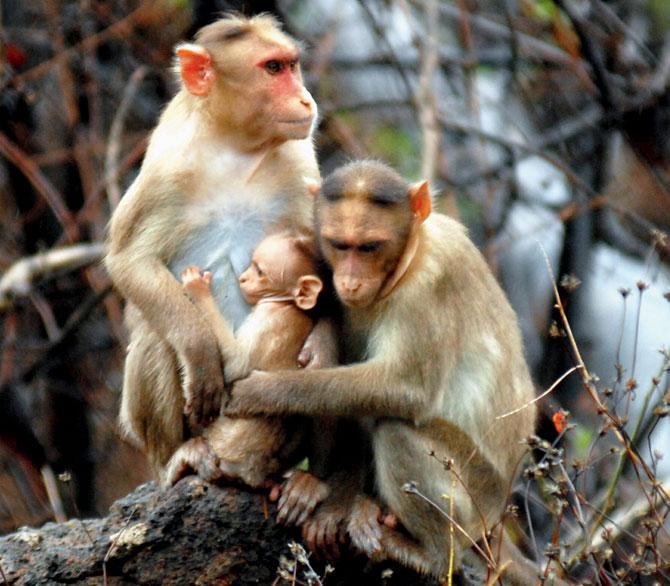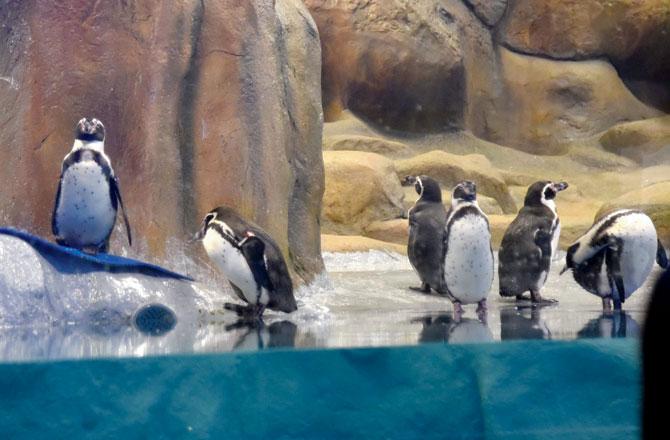Caretakers thrilled that SGNP and Byculla residents are having a blast, despite revenue loss going into crores

Sanjay Tripathi, Byculla zoo director says the animals and birds are stress-free minus visitors: The tigers are enjoying themselves in the 4,000 sqm new enclosure. We have videos of them swimming, jumping. Its amazing for us to watch. (Right) Sunil Limaye
The Veermata Jijabai Bhosale Udyaan and Zoo in Byculla began the new year on an encouraging note. Not only had four of its animal enclosures been given a swanky facelift with a pair of new tigers, leopards and other animals being brought in, the Mumbai zoo also opened its doors to a 44 ft-tall walkthrough aviary, spread across 18,234 sqft, and boasting of nearly 100 Indian and exotic birds. Wildlife biologist and international zoo educator, Anand Pendharkar, who was one of the early visitors to this newly-designed zoo, describes this change as "phenomenal". Having suffered years of neglect, the zoo, which for the last few years was mostly drawing crowds to its penguin enclosure, was finally coming into its own. But barely a month-and-a-half later, the zoo decided to close its gates, after news of the Coronavirus outbreak. This was a few days before PM Narendra Modi announced the national lockdown from March 24.
ADVERTISEMENT
It-s the first time in the zoo-s history that it has been shuttered for nearly four months. On an average, the zoo, which opened as a garden in 1862, would see a daily footfall of 8,000 to 10,000 people. During the summer holidays, the numbers would swell further. Dr Sanjay Tripathi, director of the zoo, says that the facility has incurred losses worth R3 crore since the lockdown. That it is corporation-funded means that the zoo-s financial losses are currently being taken care of. But, despite the massive revenue drop, the lockdown has come as a blessing in disguise, says Tripathi. "Animals and birds are having a field day in the zoo," he shares. "Most creatures tend to get stressed due to the constant flow of visitors. But right now, because there is no distraction, these animals are showing good, natural behaviour, like climbing trees, and wading through the pools."

Chitals, also known as spotted deer, seen moving in the visitor section of the Sanjay Gandhi National Park in Borivli. The creature of the wild usually prefers to move inside the forest, but the empty visitor area due to the lockdown, has emboldened it to leave its comfort zone
At Borivli-s Sanjay Gandhi National Park too, the constant flow of tourists, including walkers who-d come here early every morning, has come to a grinding halt. The park, which is under the Maharashtra government, got the national park status in 1996, and was shut only once briefly during the 2005 deluge. Sandwiched in a containment zone, the park shut its doors on March 17. Like the Byculla zoo, it also generated most of its revenue during the summer holidays, making nearly R7 lakh daily. The park sees 15 lakh visitors annually. But, Sunil Limaye, additional principal chief conservator of forest APCCF, Wildlife West Region, is not too upset by this downturn. "Our animals [at SGNP] look happier. They need a holiday, too," says Limaye.
The boss of their home
At the beginning of the lockdown, a large number of zoos across India had complained of facing "severe hardships" in arranging food and drinking water for animals. At the time, the Central Zoo Authority had written to the state governments and administration in Union territories, requesting to specify activities related to taking care of captive animals in zoos as --essential services--. The restrictions were eased a few weeks later.

Sunil Limaye, APCCF, Wildlife West region, says that the monkeys, which had become over-reliant for food from visitors to SGNP, have now started going into the forest to look for plants and fruits. File pic/Ashish Rane
While the Byculla zoo didn-t have to contend with this issue, it still needed its staff, and at full strength, to ensure that its 300 animals, birds and reptiles were taken care of.
"Before the lockdown, 50 per cent of our staff lived within the zoo premises, and the rest outside," says Dr Tripathi. Somewhere, around the same time, a tiger at New York-s Bronx Zoo had tested positive for COVID-19; the animal was believed to have contracted the virus from a caretaker, who was asymptomatic at the time. In order to avert a situation like this, the zoo made arrangements for its staff to stay on site. "Byculla was one of the key hotspots, and we didn-t want to put anyone at risk," Dr Tripathi adds.

Sunil Limaye and Anand Pendharkar
Since then, the 36-member team has been invested in the care of animals. With no visitors, enrichment activities are on in full measure. "We hide their food within their enclosures, so that they can go find it. Or, we simply place their food on the tree, so that they take the effort to climb up. The animals are responding well. We used to do these activities earlier too, but now that we have more time at hand, we do it more frequently," he says, adding that it helps the captive creatures interact with their surroundings better.
The tiger pair, Karishma and Shakti, who were brought from Aurangabad-s Siddharth Garden and Zoo, for instance, have become bosses of their new home. "Their new enclosure is around 4,000 sqms, with a huge pool. This is also the first facility with underwater viewing. Once, we opened the exhibit to the tigers, they were enjoying themselves. We have videos of them swimming, jumping, roaming, and running from one end to another. It was amazing for us to watch," he shares. Unfortunately, before the public could enjoy this spectacle, the lockdown was announced.

The Veermata Jijabai Bhosale Udyaan and Zoo in Byculla mostly draws crowds to its penguin exhibit. File pic/Suresh Karkera
SGNP is experiencing a similar resurgence. Range Forest Officer of the Lion Safari Park, Vijay Barabde, says that the lockdown hasn-t affected the lions and tigers, who are currently in their enclosures and were viewed during the safari tours. However, those in the wild are showing interesting behaviour. Herds of chitals, also known as the spotted deer, and sambars, are now abandoning the dense wilderness of the forest and straying into the park-s visitor area. They are often seen frolicking near the locked entrance gate and the open grounds. This wasn-t a sight one got to witness earlier, admits Limaye. Even the monkeys, who were most spoiled due to human contact, are now behaving as they are wont to. "We always desisted people from feeding the monkeys at the park, and they-d still do it. Now, that nobody is throwing food at them, they-ve started going into the forest to look for plants and fruits. All of this is a positive sign," adds Limaye.
Dhaval Kansara, honorary wildlife warden of the Palghar district and founder of the Wildlife Conservation and Animal Welfare Association WCAWA, says that the Palghar region has not reported a single road accident involving an animal in the last four months. "Earlier, due to vehicular movement, leopards and deer from the forests would stray into the highways. We-d report at least one or two accident cases every two months. That has stopped."

In the absence of visitors, tiger pair, Karishma and Shakti, who were brought from Aurangabad-s Siddharth Garden and Zoo, are enjoying their new enclosure, which has a pool with an underwater viewing facility
Animals need the break
Pendharkar, admits that many animals, especially primates, show change in behaviour when they come in contact with human beings. "Monkeys are very smart. They know what grabs everyone-s attention. That-s also why they sometimes deliberately spray at people or indulge in activity that can be construed as obscene," he says. Elephants, says Pendharkar, also tend to get stressed if they are kept too long inside an enclosure or when there-s a lot of human activity. "When that happens, they stay in the same place, and sway. That-s a sign of stress, and they are not supposed to do that. They should be walking around. Similarly, big cats, will pace up and down when uncomfortable. So, yes, it-s quite possible that animals have calmed down [in the absence of visitors at the zoo]."
But most zoo animals, he says, are used to human company and even get easily attached. "Not having their regular caretakers around, can often cause them to withdraw. Some even stop eating. In worst cases, if the caretaker has passed on, the animal also dies soon after."
Irrespective of the lockdown, he says that animals in national parks, as well as those in zoos, should be behaving naturally. "And, authorities are supposed to ensure that animal behaviour doesn-t change or get compromised." But, if there has been a significant change in animal behaviour now, Pendharkar says that authorities should use their learnings to rethink about how they can make spaces safer and habitable for them. "It-s a good time to reinvent laws and make them, more humane for our animals. So, putting an animal off display for six months is something they could consider. Or, maybe regeneration of vegetation. A carrying capacity survey would also be a good idea, to monitor the footfall of visitors and the time they spend in these spaces. The rights of the animals, after all, should always be first priority."
Limaye says that the positive response of animals at SGNP, has made them consider giving a little vacation to them. "It-s something that I plan to bring up with my senior authorities and colleagues. Shutting down the park, for a while every year, isn-t a bad idea. We are already doing that at India-s tiger reserves during the monsoon." There is, however, no plan to open the national park, anytime soon. "That discussion will only happen in August."
7 lakh
Amount Sanjay Gandhi National Park generates daily during summer holidays from visitors
10k
Daily footfall Byculla zoo used to see before it shut for lockdown
Three
Money in crores the Byculla zoo has lost in revenue due to the lockdown
FaceTime with eels
Many animals and creatures have been forgetting all about their previous lives. At the Sumida Aquarium in Tokyo, for instance, staff members noticed its garden eels hid when staff members approached the enclosure. This was, because they were slowly becoming unused to humans. Authorities then urged the public to make video calls to them, to try and prevent them from seeing visitors as a threat when the aquarium reopened. The aquarium also set up tablets facing their tank, so that users could connect via FaceTime app.
Catch up on all the latest Mumbai news, crime news, current affairs, and a complete guide from food to things to do and events across Mumbai. Also download the new mid-day Android and iOS apps to get latest updates.
Mid-Day is now on Telegram. Click here to join our channel @middayinfomedialtd and stay updated with the latest news
 Subscribe today by clicking the link and stay updated with the latest news!" Click here!
Subscribe today by clicking the link and stay updated with the latest news!" Click here!






